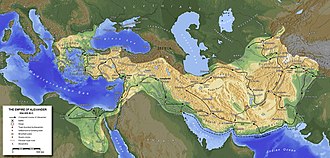Anaxarchus

Anaxarchus (/ˌænəɡˈzɑːrkəs/; Ancient Greek: Ἀνάξαρχος; c. 380 – c. 320 BC) was a Greek philosopher of the school of Democritus. Together with Pyrrho, he accompanied Alexander the Great into Asia. The reports of his philosophical views suggest that he was a forerunner of Pyrrhonism. Aelian writes that he was called Eudaemonicus or "Happy Man" (Ancient Greek: Εὐδαιμονικὸς).[1][2]
Life[]
| Part of a series on |
| Pyrrhonism |
|---|
 |
|
|
Anaxarchus was born at Abdera in Thrace. He was the companion and friend of Alexander the Great in his Asiatic campaigns. According to Diogenes Laërtius, in response to Alexander's claim to have been the son of Zeus-Ammon, Anaxarchus pointed to his bleeding wound and remarked, "See the blood of a mortal, not ichor, such as flows from the veins of the immortal gods."[3] Aelian, writes that Anaxarchus laughed at Alexander for making himself a God and said, "The hopes of our God are in a porringer of broth", when the physician prescribed a broth to Alexander.[1]
Plutarch tells a story that at Bactra, in 327 BC in a debate with Callisthenes, he advised all to worship Alexander as a god even during his lifetime, as they would surely do it after he died.[citation needed]
When Alexander was trying to show that he is divine so that the Macedonians would perform proskynesis to him, Anaxarchus said that Alexander could "more justly be considered a god than Dionysus or Heracles", as Dionysus was Theban while Heracles was Alexander's non-Macedonian ancestor. (Arrian, 104).
Diogenes Laërtius says that Nicocreon, the tyrant of Cyprus, commanded him to be pounded to death in a mortar, and that he endured this torture with fortitude. Cicero relates the same story.[4]
Philosophy[]
Very little is known about his philosophical views. It is thought that he represents a link between the atomism of Democritus, and the skepticism of Pyrrho.
Anaxarchus is said to have studied under Diogenes of Smyrna, whose teachings were said to be the same as those of Democritus' student Protagoras.[5] Diogenes studied under Metrodorus of Chios, who used to declare that he knew nothing, not even the fact that he knew nothing.[4] According to Sextus Empiricus, Anaxarchus "compared existing things to a scene-painting and supposed them to resemble the impressions experienced in sleep or madness."[6] Anaxarchus's student Pyrrho is said to have adopted "a most noble philosophy, … taking the form of agnosticism and suspension of judgement."[7] Anaxarchus is said to have praised Pyrrho's "indifference and sang-froid."[8] Anaxarchus is said to have possessed "fortitude and contentment in life," which earned him the epithet eudaimonikos ("fortunate"),[3] which may imply that he held the end of life to be eudaimonia.
Plutarch reports that he told Alexander the Great that there were an infinite number of worlds, leading Alexander to weep, for he had not yet conquered even one.[9]
References[]
- ^ Jump up to: a b Aelian, Varia Historia, 9.37
- ^ Diogenes Laërtius, Lives, ix. 60
- ^ Jump up to: a b Diogenes Laërtius, Lives, ix. 60
- ^ Jump up to: a b Diogenes Laërtius, Lives, ix. 58
- ^ Kathleen Freeman, Ancilla to the Pre-Socratic Philosophers: A Complete Translation of the Fragments in Diels, Fragmente der Vorsokratiker 1983 ISBN 0674035011 p 121
- ^ Sextus Empiricus, Against the Logicians, 7.88.
- ^ Diogenes Laërtius, Lives, ix. 61
- ^ Diogenes Laërtius, Lives, ix. 63
- ^ Plutarch. De tranquillitate animi.
External links[]
- O'Keefe, Tim. "Anaxarchus". Internet Encyclopedia of Philosophy.
 Diogenes Laërtius, Life of Anaxarchus, translated by Robert Drew Hicks (1925).
Diogenes Laërtius, Life of Anaxarchus, translated by Robert Drew Hicks (1925).
- 4th-century BC Greek people
- 4th-century BC philosophers
- Abderites
- Ancient Greek atomist philosophers
- Ancient Thracian Greeks
- Hellenistic-era philosophers
- Philosophers and tutors of Alexander the Great
- Ancient Skeptic philosophers
- Executed philosophers
- Pyrrhonism